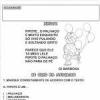Portuguese activity, focused on ninth grade students, about relative pronouns. How about analyzing them in the text after dark? To do so, answer the proposed questions!
You can download this Portuguese language activity in an editable Word template, ready to print in PDF and also the activity with answers.
Download this Portuguese exercise at:
SCHOOL: DATE:
PROF: CLASS:
NAME:
Read:
Most species of owls also have nocturnal habits. But they are not the only birds that prefer to spend the night in full swing. The urutau or mother-of-the-moon, for example, uses the night to look for large insects like locusts! – and, during the day, it stays very quiet, perched on the tips of trees, where its feathers, which look similar to branches and trunks, leave it camouflaged. Even so, the urutau is not foolish: its eyelid has an opening to alert it to daytime predators.
“Ciência Hoje das Crianças” magazine. Edition 206.
Available in:. (Fragment).
Question 1 – Highlight the following relative pronoun:
"But they're not the only birds that prefer to spend the night in full swing."
Question 2 – The previously highlighted pronoun is related to:
( ) "they".
( ) “the only birds”.
( ) "at night".
Question 3 – Identify the snippet that contains a relative pronoun:
( ) "The urutau or mother of the moon, for example, uses the night to look for insects [...]"
( ) “[…] it sits very quietly on the tips of the trees, where its feathers […]”
( ) “[…] your eyelid has an opening to alert you to daytime predators.”
Question 4 – The relative pronoun, in the excerpt identified above, could be replaced by:
( ) “to what”.
( ) “of what”.
( ) "on what".
Question 5 - Read what is said about the relative pronouns used in the text:
I. Relative pronouns are variable.
II. Relative pronouns are invariant.
III. One relative pronoun is invariant and the other relative pronoun is variable.
What is stated in:
( ) I.
( ) II.
( ) III.
By Denyse Lage Fonseca
Graduated in Languages and specialist in distance education.

